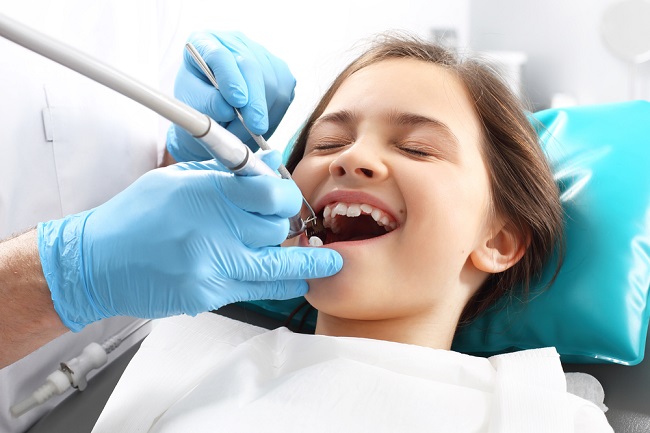Know What's Scaling Teeth
Dental scaling is a non-surgical procedure performed to clear and remove plaque and tartar on the teeth. This procedure is one of the most common dental procedures.
Plaque is a thin layer of yellow or white that attaches to the teeth. Plaque is formed when bacteria are mixed with leftover food left in the mouth, especially foods containing sugar and flour. Plaque that is allowed to harden and mix with saliva will trigger the formation of tartar or tartar. Plaque and tartar contains millions of bacteria and if not cleaned regularly, it can cause periodontitis, tooth decay, or even tooth loss.

Plaque and tartar are difficult to remove with regular brushing, requiring special actions and tools through dental scaling procedures. In addition to cleaning plaque and tartar, dental scaling is also useful for:
- Reduces excess acids and enzymes produced by bacteria in the mouth that can cause tissue damage.
- Reduce the risk of bleeding or tissue swelling resulting from the body's immune response to bacteria in plaque.
- Prevents periodontitis disease
- Maintaining dental and dental hygiene
Dental Scaling Indication
Plaque and tartar can generally appear in everyone, both children and adults. The appearance of plaque is usually not realized, because it occurs slowly and does not cause symptoms. However, before plaque and tartar are worsening and causing gum disease and teeth (periodontitis and gingivitis), patients should regularly check plaque and tartar twice a year.
In addition, there are some people who are susceptible to plaque formation and tartar, among others:
- Active smoker.
- Often eat foods that contain high levels of sugar and flour, such as candy, chocolate, or cake.
- Frequently consuming soda, coffee, or tea.
- Do not clean your teeth regularly.
Scaling of teeth will also be performed in patients with chronic periodontitis.
Warning:
- Let your doctor know if you've had an allergic reaction to a substance contained in an anesthetic.
- Tell your doctor if you're taking any medications, supplements, or herbal products, especially blood-thinning drugs (anticoagulants). Doctors will encourage patients to temporarily stop taking anticoagulant medication to prevent the risk of bleeding.
- Let your doctor know if you use an artificial joint (prosthetic). Doctors will give antibiotics to reduce the risk of side effects.
- Let your doctor know if you have heart valve disease or use an artificial heart valve
- Let your doctor know if you've had an organ transplant procedure.
Before Scaling Teeth
There are some preparations that the patient needs to do before undergoing dental scaling, including:
- Health history check. Before the patient undergoes dental scaling, the doctor will check the patient's medical history, including any history of allergy or history of the disease. This is done to prevent any potential risks.
- Examination of dental and mouth conditions. Next, the doctor checks and identifies plaque and tartar locations with a special small mirror.
Dental Scaling Procedures
The steps the doctor performed during the dental scaling procedure include:
- Dentists will provide local anesthetics to relieve pain that may arise during the cleansing process of plaque and tartar.
- The doctor starts to do the tartar cleaning process by using ultrasonic waves that can release vibrations and remove plaque and tartar. This tool can also remove cold smoke from water to clean the rest of the plaque and tartar.
- After plaque and corals around the tooth enamel are cleansed, the doctor will use a manual scavenger or scaler with pointed ends to clear plaque and corals in areas not covered by ultrasonic scrapers.
- During the process of clearing plaque and tartar, the doctor will ask the patient to rinse and throw it away so that the remaining plaque inside the mouth can be lost.
- The final step, the doctor will polish the cleaned teeth with a soft rubber polishing tool at the edges.
Scaling of teeth can be completed in one visit lasting 30-120 minutes, depending on the condition and amount of plaque and tartar.
After Dental Scaling
Patients are allowed to go home after undergoing dental scaling. Uncomfortable feeling on the mouth can be felt by patients due to the influence of anesthesia that has not disappeared completely.
The doctor will ask the patient not to drink and eat for 30-60 minutes after undergoing dental scaling. The doctor will also prescribe medication to drink and mouthwash to prevent infection, control pain, and help the healing process.
In addition, the doctor will also schedule the patient to undergo gum examination and ensure the patient's mouth condition has healed completely.
Patients can also do some things to take care of the teeth and reduce the risk of plaque formation. These actions include:
- Brush your teeth at least twice a day with toothpaste containing fluoride and triclosan . Fluoride can help repair damaged tooth enamel, while triclosan can fight bacteria in plaque.
- Replace a toothbrush if brush hair is damaged.
- Use dental floss to remove plaque that lies between the teeth and prevent the formation of tartar in hard-to-reach areas.
- Consult a dentist about routinely gargling that contains antiseptics to help kill plaque-causing bacteria.
- Eat healthy foods and eat less sweet and starchy foods.
- Quit smoking.
- Undergo regular dental examination at least 6 months to clear plaque and prevent the risk of dental or gum disease.
Dental Scaling Risks
Dental scaling is one of the safest dental procedures. However, this procedure has several risks that may occur in patients, among others:
- Sensitive teeth.
- Infection.
- Pain, swelling, or bleeding in the gums.
- Lips are dry and cracked.
- Bacteraemia. Increasing the number of bacteria in the blood can trigger sepsis in patients with low immune systems and endocarditis in patients with heart problems.